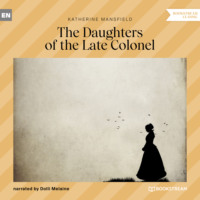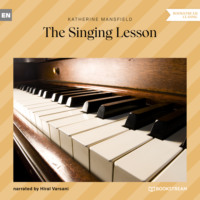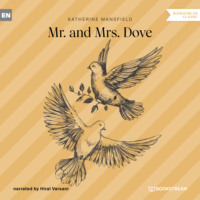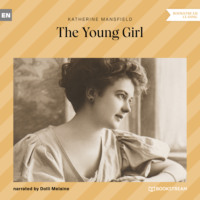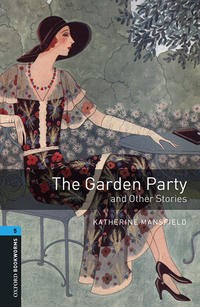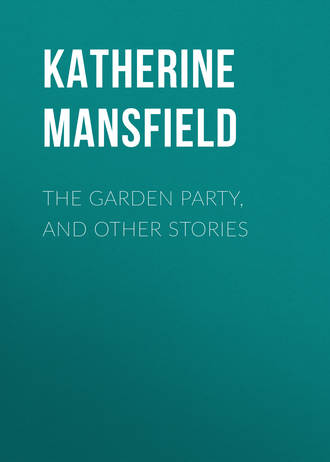 полная версия
полная версияThe Garden Party, and Other Stories
“Speaking of Benny,” said Josephine.
And though Benny hadn’t been mentioned Constantia immediately looked as though he had.
“He’ll expect us to send him something of father’s, of course. But it’s so difficult to know what to send to Ceylon.”
“You mean things get unstuck so on the voyage,” murmured Constantia.
“No, lost,” said Josephine sharply. “You know there’s no post. Only runners.”
Both paused to watch a black man in white linen drawers running through the pale fields for dear life, with a large brown-paper parcel in his hands. Josephine’s black man was tiny; he scurried along glistening like an ant. But there was something blind and tireless about Constantia’s tall, thin fellow, which made him, she decided, a very unpleasant person indeed… On the veranda, dressed all in white and wearing a cork helmet, stood Benny. His right hand shook up and down, as father’s did when he was impatient. And behind him, not in the least interested, sat Hilda, the unknown sister-in-law. She swung in a cane rocker and flicked over the leaves of the “Tatler.”
“I think his watch would be the most suitable present,” said Josephine.
Constantia looked up; she seemed surprised.
“Oh, would you trust a gold watch to a native?”
“But of course, I’d disguise it,” said Josephine. “No one would know it was a watch.” She liked the idea of having to make a parcel such a curious shape that no one could possibly guess what it was. She even thought for a moment of hiding the watch in a narrow cardboard corset-box that she’d kept by her for a long time, waiting for it to come in for something. It was such beautiful, firm cardboard. But, no, it wouldn’t be appropriate for this occasion. It had lettering on it: “Medium Women’s 28. Extra Firm Busks.” It would be almost too much of a surprise for Benny to open that and find father’s watch inside.
“And of course it isn’t as though it would be going—ticking, I mean,” said Constantia, who was still thinking of the native love of jewellery. “At least,” she added, “it would be very strange if after all that time it was.”
Chapter 3.VIII
Josephine made no reply. She had flown off on one of her tangents. She had suddenly thought of Cyril. Wasn’t it more usual for the only grandson to have the watch? And then dear Cyril was so appreciative, and a gold watch meant so much to a young man. Benny, in all probability, had quite got out of the habit of watches; men so seldom wore waistcoats in those hot climates. Whereas Cyril in London wore them from year’s end to year’s end. And it would be so nice for her and Constantia, when he came to tea, to know it was there. “I see you’ve got on grandfather’s watch, Cyril.” It would be somehow so satisfactory.
Dear boy! What a blow his sweet, sympathetic little note had been! Of course they quite understood; but it was most unfortunate.
“It would have been such a point, having him,” said Josephine.
“And he would have enjoyed it so,” said Constantia, not thinking what she was saying.
However, as soon as he got back he was coming to tea with his aunties. Cyril to tea was one of their rare treats.
“Now, Cyril, you mustn’t be frightened of our cakes. Your Auntie Con and I bought them at Buszard’s this morning. We know what a man’s appetite is. So don’t be ashamed of making a good tea.”
Josephine cut recklessly into the rich dark cake that stood for her winter gloves or the soling and heeling of Constantia’s only respectable shoes. But Cyril was most unmanlike in appetite.
“I say, Aunt Josephine, I simply can’t. I’ve only just had lunch, you know.”
“Oh, Cyril, that can’t be true! It’s after four,” cried Josephine. Constantia sat with her knife poised over the chocolate-roll.
“It is, all the same,” said Cyril. “I had to meet a man at Victoria, and he kept me hanging about till… there was only time to get lunch and to come on here. And he gave me—phew”—Cyril put his hand to his forehead—“a terrific blow-out,” he said.
It was disappointing—to-day of all days. But still he couldn’t be expected to know.
“But you’ll have a meringue, won’t you, Cyril?” said Aunt Josephine. “These meringues were bought specially for you. Your dear father was so fond of them. We were sure you are, too.”
“I am, Aunt Josephine,” cried Cyril ardently. “Do you mind if I take half to begin with?”
“Not at all, dear boy; but we mustn’t let you off with that.”
“Is your dear father still so fond of meringues?” asked Auntie Con gently. She winced faintly as she broke through the shell of hers.
“Well, I don’t quite know, Auntie Con,” said Cyril breezily.
At that they both looked up.
“Don’t know?” almost snapped Josephine. “Don’t know a thing like that about your own father, Cyril?”
“Surely,” said Auntie Con softly.
Cyril tried to laugh it off. “Oh, well,” he said, “it’s such a long time since—” He faltered. He stopped. Their faces were too much for him.
“Even so,” said Josephine.
And Auntie Con looked.
Cyril put down his teacup. “Wait a bit,” he cried. “Wait a bit, Aunt Josephine. What am I thinking of?”
He looked up. They were beginning to brighten. Cyril slapped his knee.
“Of course,” he said, “it was meringues. How could I have forgotten? Yes, Aunt Josephine, you’re perfectly right. Father’s most frightfully keen on meringues.”
They didn’t only beam. Aunt Josephine went scarlet with pleasure; Auntie Con gave a deep, deep sigh.
“And now, Cyril, you must come and see father,” said Josephine. “He knows you were coming to-day.”
“Right,” said Cyril, very firmly and heartily. He got up from his chair; suddenly he glanced at the clock.
“I say, Auntie Con, isn’t your clock a bit slow? I’ve got to meet a man at—at Paddington just after five. I’m afraid I shan’t be able to stay very long with grandfather.”
“Oh, he won’t expect you to stay very long!” said Aunt Josephine.
Constantia was still gazing at the clock. She couldn’t make up her mind if it was fast or slow. It was one or the other, she felt almost certain of that. At any rate, it had been.
Cyril still lingered. “Aren’t you coming along, Auntie Con?”
“Of course,” said Josephine, “we shall all go. Come on, Con.”
Chapter 3.IX
They knocked at the door, and Cyril followed his aunts into grandfather’s hot, sweetish room.
“Come on,” said Grandfather Pinner. “Don’t hang about. What is it? What’ve you been up to?”
He was sitting in front of a roaring fire, clasping his stick. He had a thick rug over his knees. On his lap there lay a beautiful pale yellow silk handkerchief.
“It’s Cyril, father,” said Josephine shyly. And she took Cyril’s hand and led him forward.
“Good afternoon, grandfather,” said Cyril, trying to take his hand out of Aunt Josephine’s. Grandfather Pinner shot his eyes at Cyril in the way he was famous for. Where was Auntie Con? She stood on the other side of Aunt Josephine; her long arms hung down in front of her; her hands were clasped. She never took her eyes off grandfather.
“Well,” said Grandfather Pinner, beginning to thump, “what have you got to tell me?”
What had he, what had he got to tell him? Cyril felt himself smiling like a perfect imbecile. The room was stifling, too.
But Aunt Josephine came to his rescue. She cried brightly, “Cyril says his father is still very fond of meringues, father dear.”
“Eh?” said Grandfather Pinner, curving his hand like a purple meringue-shell over one ear.
Josephine repeated, “Cyril says his father is still very fond of meringues.”
“Can’t hear,” said old Colonel Pinner. And he waved Josephine away with his stick, then pointed with his stick to Cyril. “Tell me what she’s trying to say,” he said.
(My God!) “Must I?” said Cyril, blushing and staring at Aunt Josephine.
“Do, dear,” she smiled. “It will please him so much.”
“Come on, out with it!” cried Colonel Pinner testily, beginning to thump again.
And Cyril leaned forward and yelled, “Father’s still very fond of meringues.”
At that Grandfather Pinner jumped as though he had been shot.
“Don’t shout!” he cried. “What’s the matter with the boy? Meringues! What about ‘em?”
“Oh, Aunt Josephine, must we go on?” groaned Cyril desperately.
“It’s quite all right, dear boy,” said Aunt Josephine, as though he and she were at the dentist’s together. “He’ll understand in a minute.” And she whispered to Cyril, “He’s getting a bit deaf, you know.” Then she leaned forward and really bawled at Grandfather Pinner, “Cyril only wanted to tell you, father dear, that his father is still very fond of meringues.”
Colonel Pinner heard that time, heard and brooded, looking Cyril up and down.
“What an esstrordinary thing!” said old Grandfather Pinner. “What an esstrordinary thing to come all this way here to tell me!”
And Cyril felt it was.
“Yes, I shall send Cyril the watch,” said Josephine.
“That would be very nice,” said Constantia. “I seem to remember last time he came there was some little trouble about the time.”
Chapter 3.X
They were interrupted by Kate bursting through the door in her usual fashion, as though she had discovered some secret panel in the wall.
“Fried or boiled?” asked the bold voice.
Fried or boiled? Josephine and Constantia were quite bewildered for the moment. They could hardly take it in.
“Fried or boiled what, Kate?” asked Josephine, trying to begin to concentrate.
Kate gave a loud sniff. “Fish.”
“Well, why didn’t you say so immediately?” Josephine reproached her gently. “How could you expect us to understand, Kate? There are a great many things in this world you know, which are fried or boiled.” And after such a display of courage she said quite brightly to Constantia, “Which do you prefer, Con?”
“I think it might be nice to have it fried,” said Constantia. “On the other hand, of course, boiled fish is very nice. I think I prefer both equally well… Unless you… In that case—”
“I shall fry it,” said Kate, and she bounced back, leaving their door open and slamming the door of her kitchen.
Josephine gazed at Constantia; she raised her pale eyebrows until they rippled away into her pale hair. She got up. She said in a very lofty, imposing way, “Do you mind following me into the drawing-room, Constantia? I’ve got something of great importance to discuss with you.”
For it was always to the drawing-room they retired when they wanted to talk over Kate.
Josephine closed the door meaningly. “Sit down, Constantia,” she said, still very grand. She might have been receiving Constantia for the first time. And Con looked round vaguely for a chair, as though she felt indeed quite a stranger.
“Now the question is,” said Josephine, bending forward, “whether we shall keep her or not.”
“That is the question,” agreed Constantia.
“And this time,” said Josephine firmly, “we must come to a definite decision.”
Constantia looked for a moment as though she might begin going over all the other times, but she pulled herself together and said, “Yes, Jug.”
“You see, Con,” explained Josephine, “everything is so changed now.” Constantia looked up quickly. “I mean,” went on Josephine, “we’re not dependent on Kate as we were.” And she blushed faintly. “There’s not father to cook for.”
“That is perfectly true,” agreed Constantia. “Father certainly doesn’t want any cooking now, whatever else—”
Josephine broke in sharply, “You’re not sleepy, are you, Con?”
“Sleepy, Jug?” Constantia was wide-eyed.
“Well, concentrate more,” said Josephine sharply, and she returned to the subject. “What it comes to is, if we did”—and this she barely breathed, glancing at the door—“give Kate notice”—she raised her voice again—“we could manage our own food.”
“Why not?” cried Constantia. She couldn’t help smiling. The idea was so exciting. She clasped her hands. “What should we live on, Jug?”
“Oh, eggs in various forms!” said Jug, lofty again. “And, besides, there are all the cooked foods.”
“But I’ve always heard,” said Constantia, “they are considered so very expensive.”
“Not if one buys them in moderation,” said Josephine. But she tore herself away from this fascinating bypath and dragged Constantia after her.
“What we’ve got to decide now, however, is whether we really do trust Kate or not.”
Constantia leaned back. Her flat little laugh flew from her lips.
“Isn’t it curious, Jug,” said she, “that just on this one subject I’ve never been able to quite make up my mind?”
Chapter 3.XI
She never had. The whole difficulty was to prove anything. How did one prove things, how could one? Suppose Kate had stood in front of her and deliberately made a face. Mightn’t she very well have been in pain? Wasn’t it impossible, at any rate, to ask Kate if she was making a face at her? If Kate answered “No”—and, of course, she would say “No”—what a position! How undignified! Then again Constantia suspected, she was almost certain that Kate went to her chest of drawers when she and Josephine were out, not to take things but to spy. Many times she had come back to find her amethyst cross in the most unlikely places, under her lace ties or on top of her evening Bertha. More than once she had laid a trap for Kate. She had arranged things in a special order and then called Josephine to witness.
“You see, Jug?”
“Quite, Con.”
“Now we shall be able to tell.”
But, oh dear, when she did go to look, she was as far off from a proof as ever! If anything was displaced, it might so very well have happened as she closed the drawer; a jolt might have done it so easily.
“You come, Jug, and decide. I really can’t. It’s too difficult.”
But after a pause and a long glare Josephine would sigh, “Now you’ve put the doubt into my mind, Con, I’m sure I can’t tell myself.”
“Well, we can’t postpone it again,” said Josephine. “If we postpone it this time—”
Chapter 3.XII
But at that moment in the street below a barrel-organ struck up. Josephine and Constantia sprang to their feet together.
“Run, Con,” said Josephine. “Run quickly. There’s sixpence on the—”
Then they remembered. It didn’t matter. They would never have to stop the organ-grinder again. Never again would she and Constantia be told to make that monkey take his noise somewhere else. Never would sound that loud, strange bellow when father thought they were not hurrying enough. The organ-grinder might play there all day and the stick would not thump.
“It never will thump again, It never will thump again,played the barrel-organ.
What was Constantia thinking? She had such a strange smile; she looked different. She couldn’t be going to cry.
“Jug, Jug,” said Constantia softly, pressing her hands together. “Do you know what day it is? It’s Saturday. It’s a week to-day, a whole week.”
“A week since father died, A week since father died,”cried the barrel-organ. And Josephine, too, forgot to be practical and sensible; she smiled faintly, strangely. On the Indian carpet there fell a square of sunlight, pale red; it came and went and came—and stayed, deepened—until it shone almost golden.
“The sun’s out,” said Josephine, as though it really mattered.
A perfect fountain of bubbling notes shook from the barrel-organ, round, bright notes, carelessly scattered.
Constantia lifted her big, cold hands as if to catch them, and then her hands fell again. She walked over to the mantelpiece to her favourite Buddha. And the stone and gilt image, whose smile always gave her such a queer feeling, almost a pain and yet a pleasant pain, seemed to-day to be more than smiling. He knew something; he had a secret. “I know something that you don’t know,” said her Buddha. Oh, what was it, what could it be? And yet she had always felt there was… something.
The sunlight pressed through the windows, thieved its way in, flashed its light over the furniture and the photographs. Josephine watched it. When it came to mother’s photograph, the enlargement over the piano, it lingered as though puzzled to find so little remained of mother, except the earrings shaped like tiny pagodas and a black feather boa. Why did the photographs of dead people always fade so? wondered Josephine. As soon as a person was dead their photograph died too. But, of course, this one of mother was very old. It was thirty-five years old. Josephine remembered standing on a chair and pointing out that feather boa to Constantia and telling her that it was a snake that had killed their mother in Ceylon… Would everything have been different if mother hadn’t died? She didn’t see why. Aunt Florence had lived with them until they had left school, and they had moved three times and had their yearly holiday and… and there’d been changes of servants, of course.
Some little sparrows, young sparrows they sounded, chirped on the window-ledge. “Yeep—eyeep—yeep.” But Josephine felt they were not sparrows, not on the window-ledge. It was inside her, that queer little crying noise. “Yeep—eyeep—yeep.” Ah, what was it crying, so weak and forlorn?
If mother had lived, might they have married? But there had been nobody for them to marry. There had been father’s Anglo-Indian friends before he quarrelled with them. But after that she and Constantia never met a single man except clergymen. How did one meet men? Or even if they’d met them, how could they have got to know men well enough to be more than strangers? One read of people having adventures, being followed, and so on. But nobody had ever followed Constantia and her. Oh yes, there had been one year at Eastbourne a mysterious man at their boarding-house who had put a note on the jug of hot water outside their bedroom door! But by the time Connie had found it the steam had made the writing too faint to read; they couldn’t even make out to which of them it was addressed. And he had left next day. And that was all. The rest had been looking after father, and at the same time keeping out of father’s way. But now? But now? The thieving sun touched Josephine gently. She lifted her face. She was drawn over to the window by gentle beams…
Until the barrel-organ stopped playing Constantia stayed before the Buddha, wondering, but not as usual, not vaguely. This time her wonder was like longing. She remembered the times she had come in here, crept out of bed in her nightgown when the moon was full, and lain on the floor with her arms outstretched, as though she was crucified. Why? The big, pale moon had made her do it. The horrible dancing figures on the carved screen had leered at her and she hadn’t minded. She remembered too how, whenever they were at the seaside, she had gone off by herself and got as close to the sea as she could, and sung something, something she had made up, while she gazed all over that restless water. There had been this other life, running out, bringing things home in bags, getting things on approval, discussing them with Jug, and taking them back to get more things on approval, and arranging father’s trays and trying not to annoy father. But it all seemed to have happened in a kind of tunnel. It wasn’t real. It was only when she came out of the tunnel into the moonlight or by the sea or into a thunderstorm that she really felt herself. What did it mean? What was it she was always wanting? What did it all lead to? Now? Now?
She turned away from the Buddha with one of her vague gestures. She went over to where Josephine was standing. She wanted to say something to Josephine, something frightfully important, about—about the future and what…
“Don’t you think perhaps—” she began.
But Josephine interrupted her. “I was wondering if now—” she murmured. They stopped; they waited for each other.
“Go on, Con,” said Josephine.
“No, no, Jug; after you,” said Constantia.
“No, say what you were going to say. You began,” said Josephine.
“I… I’d rather hear what you were going to say first,” said Constantia.
“Don’t be absurd, Con.”
“Really, Jug.”
“Connie!”
“Oh, Jug!”
A pause. Then Constantia said faintly, “I can’t say what I was going to say, Jug, because I’ve forgotten what it was… that I was going to say.”
Josephine was silent for a moment. She stared at a big cloud where the sun had been. Then she replied shortly, “I’ve forgotten too.”
4. MR. AND MRS. DOVE
Of course he knew—no man better—that he hadn’t a ghost of a chance, he hadn’t an earthly. The very idea of such a thing was preposterous. So preposterous that he’d perfectly understand it if her father—well, whatever her father chose to do he’d perfectly understand. In fact, nothing short of desperation, nothing short of the fact that this was positively his last day in England for God knows how long, would have screwed him up to it. And even now… He chose a tie out of the chest of drawers, a blue and cream check tie, and sat on the side of his bed. Supposing she replied, “What impertinence!” would he be surprised? Not in the least, he decided, turning up his soft collar and turning it down over the tie. He expected her to say something like that. He didn’t see, if he looked at the affair dead soberly, what else she could say.
Here he was! And nervously he tied a bow in front of the mirror, jammed his hair down with both hands, pulled out the flaps of his jacket pockets. Making between 500 and 600 pounds a year on a fruit farm in—of all places—Rhodesia. No capital. Not a penny coming to him. No chance of his income increasing for at least four years. As for looks and all that sort of thing, he was completely out of the running. He couldn’t even boast of top-hole health, for the East Africa business had knocked him out so thoroughly that he’d had to take six months’ leave. He was still fearfully pale—worse even than usual this afternoon, he thought, bending forward and peering into the mirror. Good heavens! What had happened? His hair looked almost bright green. Dash it all, he hadn’t green hair at all events. That was a bit too steep. And then the green light trembled in the glass; it was the shadow from the tree outside. Reggie turned away, took out his cigarette case, but remembering how the mater hated him to smoke in his bedroom, put it back again and drifted over to the chest of drawers. No, he was dashed if he could think of one blessed thing in his favour, while she… Ah!… He stopped dead, folded his arms, and leaned hard against the chest of drawers.
And in spite of her position, her father’s wealth, the fact that she was an only child and far and away the most popular girl in the neighbourhood; in spite of her beauty and her cleverness—cleverness!—it was a great deal more than that, there was really nothing she couldn’t do; he fully believed, had it been necessary, she would have been a genius at anything—in spite of the fact that her parents adored her, and she them, and they’d as soon let her go all that way as… In spite of every single thing you could think of, so terrific was his love that he couldn’t help hoping. Well, was it hope? Or was this queer, timid longing to have the chance of looking after her, of making it his job to see that she had everything she wanted, and that nothing came near her that wasn’t perfect—just love? How he loved her! He squeezed hard against the chest of drawers and murmured to it, “I love her, I love her!” And just for the moment he was with her on the way to Umtali. It was night. She sat in a corner asleep. Her soft chin was tucked into her soft collar, her gold-brown lashes lay on her cheeks. He doted on her delicate little nose, her perfect lips, her ear like a baby’s, and the gold-brown curl that half covered it. They were passing through the jungle. It was warm and dark and far away. Then she woke up and said, “Have I been asleep?” and he answered, “Yes. Are you all right? Here, let me—” And he leaned forward to… He bent over her. This was such bliss that he could dream no further. But it gave him the courage to bound downstairs, to snatch his straw hat from the hall, and to say as he closed the front door, “Well, I can only try my luck, that’s all.”
But his luck gave him a nasty jar, to say the least, almost immediately. Promenading up and down the garden path with Chinny and Biddy, the ancient Pekes, was the mater. Of course Reginald was fond of the mater and all that. She—she meant well, she had no end of grit, and so on. But there was no denying it, she was rather a grim parent. And there had been moments, many of them, in Reggie’s life, before Uncle Alick died and left him the fruit farm, when he was convinced that to be a widow’s only son was about the worst punishment a chap could have. And what made it rougher than ever was that she was positively all that he had. She wasn’t only a combined parent, as it were, but she had quarrelled with all her own and the governor’s relations before Reggie had won his first trouser pockets. So that whenever Reggie was homesick out there, sitting on his dark veranda by starlight, while the gramophone cried, “Dear, what is Life but Love?” his only vision was of the mater, tall and stout, rustling down the garden path, with Chinny and Biddy at her heels…


